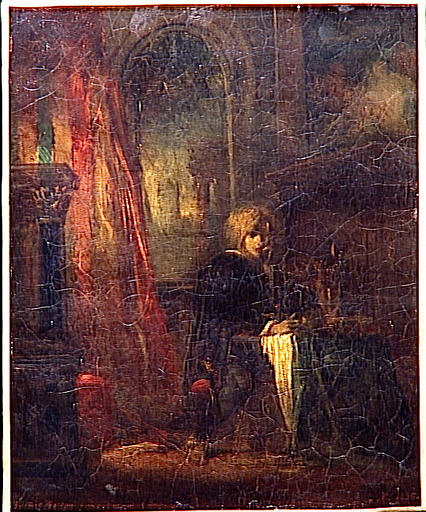editions:
[1922]
[html]
[archv]
notes: [Th] [G&S] [Dent] [wbks] [rw] [images] [hyper]
Delaney: [328] Useen: [] [cp] maps: [other] [*]
fd: [327]
<
notes: [Th] [G&S] [Dent] [wbks] [rw] [images] [hyper]
Delaney: [328] Useen: [] [cp] maps: [other] [*]
fd: [327]
— I feel you would need one more for Hamlet. Seven is dear to the mystic mind. The shining seven W.B. calls them.
JE speaking
WB = 39yo Yeats, friends with both since highschool
'The Shining Seven' appears only in the earliest revisions of 'A Cradle Song'
Glittereyed, his rufous skull close to his greencapped desklamp sought the face, bearded amid darkgreener shadow, an ollav, holyeyed. He laughed low: a sizar's laugh of Trinity: unanswered.
JE looks to his ?hero AE for approval
.aspx) |
| 1903 AE self-portrait |
Orchestral Satan, weeping many a rood
Tears such as angels weep.
Ed egli avea del cul fatto trombetta.
He holds my follies hostage.
(so SD is embarrassed by this memory)
fd:
[328]
Cranly's eleven true Wicklowmen to free their sireland. Gaptoothed Kathleen, her four beautiful green fields, the stranger in her house. And one more to hail him: ave, rabbi. The Tinahely twelve. In the shadow of the glen he cooees for them. My soul's youth I gave him, night by night. Godspeed. Good hunting.
'gap-toothed' in Chaucer's time implied lusty
"In the shadow of the glen" Synge ebook (pronun: SING)
"cooees" = Australian call
Mulligan has my telegram.
(on p191 BM will read the telegram, addressed to Malachi Mulligan, the Ship, lower Abbey street, aloud: "The sentimentalist is he who would enjoy without incurring the immense debtorship for a thing done. Signed: Dedalus.")
Folly. Persist.
Blake "If the fool would persist in his folly he would become wise."
— Our young Irish bards, John Eglinton censured, have yet to create a figure which the world will set beside Saxon Shakespeare's Hamlet though I admire him, as old Ben did, on this side idolatry.
Synge: 33yo, Stephens: 24, Colum: 22, SD: 22
Ben Jonson "...I lov'd the man, and doe honour his memory (on this fide Idolatry) as much as any." [cite]
— All these questions are purely academic, Russell oracled out of his shadow. I mean, whether Hamlet is Shakespeare or James I or Essex. Clergymen's discussions of the historicity of Jesus. Art has to reveal to us ideas, formless spiritual essences. The supreme question about a work of art is out of how deep a life does it spring. The painting of Gustave Moreau is the painting of ideas. The deepest poetry of Shelley, the words of Hamlet bring our minds into contact with the eternal wisdom, Plato's world of ideas. All the rest is the speculation of schoolboys for schoolboys.
how deep a life
 |
| Moreau's Hamlet, c1850? |
A.E. has been telling some yankee interviewer. Wall, tarnation strike me!
p135 (to SD, the USA is all Huckleberry Finns?)
— The schoolmen were schoolboys first, Stephen said superpolitely. Aristotle was once Plato's schoolboy.
superpolite = hinting underlying fury?
— And has remained so, one should hope, John Eglinton sedately said. One can see him, a model schoolboy with his diploma under his arm.
mysteries:
[DD 02:18-03:58]
[DD 00:00-01:45]
[IM 01:38-04:09]
[LV1 02:52-05:26]
[LV2 02:00-04:21]
No comments:
Post a Comment